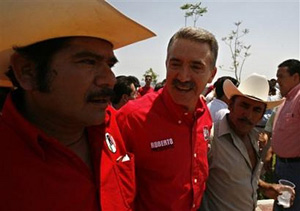 |
 |
 |
 Editorials | At Issue | May 2006 Editorials | At Issue | May 2006  
The Mexican Presidential Race Still Has Surprises
 Kenneth Emmond - MexiData.info Kenneth Emmond - MexiData.info


| | Mexican presidential candidate Roberto Madrazo, center, of the Institutional Revolutionary Party, PRI, embraces local peasant leaders in the town of Plan de Ayala, Mexico on April 20, 2006. Madrazo, a career member of the political party that ruled Mexico for 71 straight years, is accused of being a dinosaur from Mexico's authoritarian past but claims he will help Mexico's poor without hurting its rich, and cites his party leadership as his main credential for the top job. (AP/Dario Lopez-Mills) |
Just because Mexico’s presidential election campaign is a long, even dreary process doesn’t mean it can’t serve up surprises.

Right from the start Roberto Madrazo confounded his friends and delighted his enemies by becoming firmly entrenched as the show horse in a three-way race.

The vaunted political machine of the Institutional Revolutionary Party (PRI) isn’t delivering, so the candidate for the “Alliance for Mexico” – the PRI-Green Party coalition – remains stuck with about 25 percent of popular support.

Felipe Calderon, the National Action Party (PAN) standard-bearer, wasn’t supposed to even make it past the primaries. Yet he nudged past Madrazo in December to grab second place and now he’s moved into the lead, according to most opinion polls.

The biggest surprise is the slippage in the campaign of Andres Manuel Lopez Obrador, candidate of the coalition “For the Good of All,” which unites the Party of the Democratic Revolution (PRD), Workers’ Party (PT), and Convergence Party.

What happened?

Love him or hate him, either Lopez Obrador knows something we don’t or he’s committing serious errors.

He’s making three mistakes, each one potentially fatal to his Election Day success –micromanagement, intransigence, and denial. These are not traits one normally looks for in a leader.

The leftwing weekly magazine Proceso details each of them in its April 30 edition in a series of concerned articles about its favorite candidate.

It describes a PRD meeting to discuss Calderon’s April surge in the polls. Those who arrived with ideas for strategic adjustments never got to present them because Lopez Obrador said he would continue to direct the campaign himself, and he had no plans to change strategy.

There are two motives for hiring a campaign manager – to maximize the time the candidate spends campaigning and to bring in expert opinion.

Both Madrazo and Calderon hired campaign strategists with proven track records in the U.S., and both changed tactics when their campaigns seemed to stall. For Calderon at least this has worked wonders.

Despite opinion polls that show him trailing Calderon, Lopez Obrador denies that anyone else is even close to him. He cites polls of his own showing him with 40 percent of decided voters, compared with 30 percent for Calderon and 27 percent for Madrazo.

Fair enough as far as it goes, but he won’t say who conducts his polls, the wording of the questions, the size and homogeneity of the samples – or who’s footing the bill.

He accuses Calderon and the President’s office of manipulating poll results, a point he never raised during the two years he was undisputed head of the pack.

He refuses to accept the notion that it was a mistake not to take part in the April 25 candidates’ debate, where Calderon raised his standing.

Lopez Obrador operates on intuition, his sense of what the people want. That’s either his strong suit or his weak one, depending on whether voters prove him right. It worked last year in the “desafuero” scandal, the move to strip him of elected official protections, when his political enemies tried to nip his chance to run for president in the bud by maliciously hanging a frivolous criminal charge on him.

Even his opponents in the press supported him in his fight against a capricious interpretation of law, and now he’s got his chance to become Mexico’s President. Whether the same formula works in that context remains to be seen.

Like many one-man shows, Lopez Obrador has generated problems within the party.

One of the biggest is that he’s failed to gain the support of the PRD’s most prestigious member – Cuauhtemoc Cardenas, a party founder and its candidate in the past three elections.

The issue says Cuauhtemoc’s son Lazaro, Governor of Michoacan, is Lopez Obrador’s choices of candidates for the Senate and the Chamber of Deputies, some of whom are deserters from the PRI.

“It’s nothing personal,” said Lazaro. “There are people like my father and Porfirio Muńoz Ledo who left the PRI as part of a democratic struggle (as did Lopez Obrador): now others are arriving simply because they did not fit in the PRI lists, or because it’s better to ride the elevator that’s going up.” He said his father worries that this might turn the PRD into a recycled PRI.

There are still seven weeks before the July 2 elections – plenty of time for more surprises. In a race as close as this one, anything can happen, especially if the candidate For the Good of All really does know something we don’t.

Kenneth Emmond, an economist, market consultant and journalist who has lived in Mexico since 1995, is also a columnist with MexiData.info. He can be reached via e-mail at Kemmond00@yahoo.com. | 
 | |
 |



